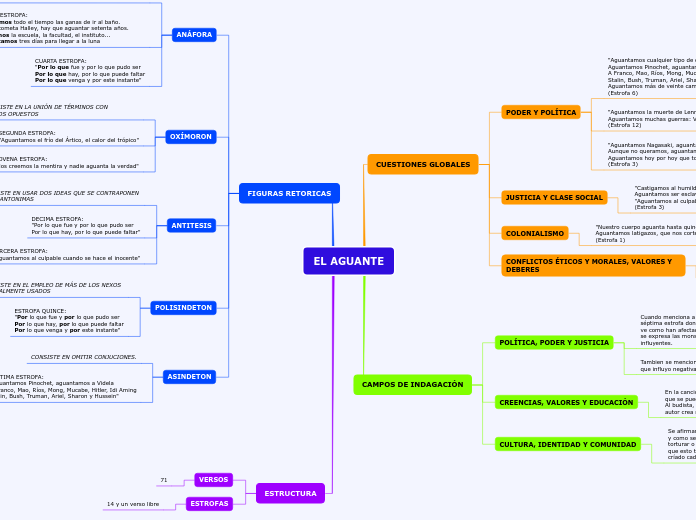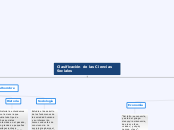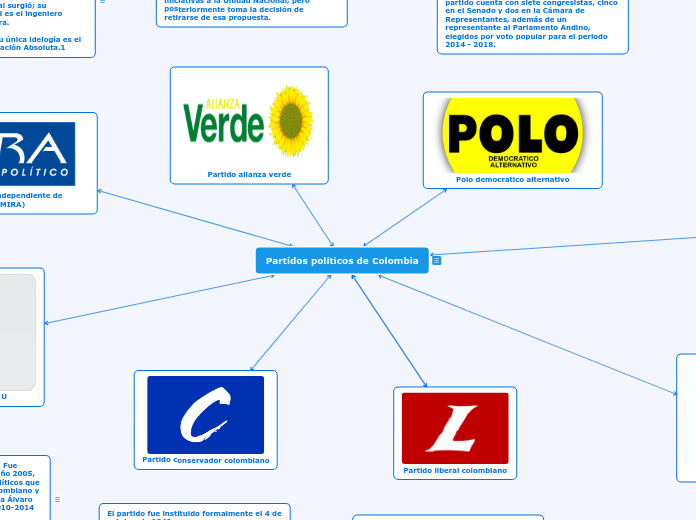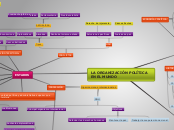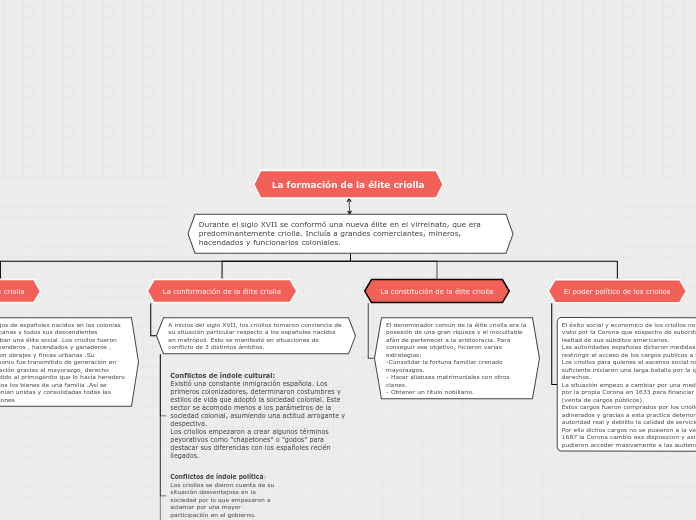EL AGUANTE
In linguistics, syntax is the set of rules, principles, and processes that govern the structure of sentences in a given language, usually including word order.
ESTRUCTURA
A compound sentence is a sentence that has at least two independent clauses joined by a comma, semicolon or conjunction. An independent clause is a clause that has a subject and verb and forms a complete thought.
ESTROFAS
Create your own compound sentences, using the coordinators above.
14 y un verso libre
VERSOS
When independent clauses are joined with coordinators (also called coordinating conjunctions), commas and semicolons, they do more than just join the clauses. They add meaning and flow to your writing.
71
FIGURAS RETORICAS
A complex sentence is a sentence that contains an independent clause and one or more dependent clauses.
An independent clause can stand alone as a sentence, but a dependent clause even though it has a subject and a verb cannot stand alone.
ASINDETON
An adverbial clause is a group of two or more words that function as an adverb in a sentence.
SEPTIMA ESTROFA:
"Aguantamos Pinochet, aguantamos a Videla
A Franco, Mao, Ríos, Mong, Mucabe, Hitler, Idi Aming
Stalin, Bush, Truman, Ariel, Sharon y Hussein"
CONSISTE EN OMITIR CONJUCIONES.
POLISINDETON
An appositive clause follows another noun or noun phrase in apposition to it; that is, it provides information that further identifies or defines it.
ESTROFA QUINCE:
"Por lo que fue y por lo que pudo ser
Por lo que hay, por lo que puede faltar
Por lo que venga y por este instante"
CONSISTE EN EL EMPLEO DE MÁS DE LOS NEXOS NORMALMENTE USADOS
ANTITESIS
The subject clause is a dependent clause that acts as a subject.
TERCERA ESTROFA:
"Aguantamos al culpable cuando se hace el inocente"
DECIMA ESTROFA:
"Por lo que fue y por lo que pudo ser
Por lo que hay, por lo que puede faltar"
ESTA CONSISTE EN USAR DOS IDEAS QUE SE CONTRAPONEN O QUE SON ANTONIMAS
OXÍMORON
A predicative clause may be introduced by conjunctions - that, whether, whether... or, as, as if, as though, because, lest, the way - or connectives.
The latter may be conjunctive pronouns - who, whoever, what, whatever, which - or conjunctive adverbs - where, wherever, when, whenever, how, why.
NOVENA ESTROFA:
"Nos creemos la mentira y nadie aguanta la verdad"
SEGUNDA ESTROFA:
"Aguantamos el frío del Ártico, el calor del trópico"
ESTA COSNSISTE EN LA UNIÓN DE TÉRMINOS CON SIGNIFICADOS OPUESTOS
ANÁFORA
The object clause is a phrase on which a verb performs an action. It falls at the end of a sentence, and is governed by a verb or a preposition.
CUARTA ESTROFA:
"Por lo que fue y por lo que pudo ser
Por lo que hay, por lo que puede faltar
Por lo que venga y por este instante"
SEGUNDA ESTROFA:
"Aguantamos todo el tiempo las ganas de ir al baño.
Pa’ ver el cometa Halley, hay que aguantar setenta años. Aguantamos la escuela, la facultad, el instituto... ....Aguantamos tres días para llegar a la luna
ESTA CONSISTE EN LA REPETICIÓN DE PALABRAS AL PRINCIPIO DE CADA VERSO
CAMPOS DE INDAGACIÓN
CULTURA, IDENTIDAD Y COMUNIDAD
See the example below and try to create your own simple sentences.
Tim is the driver.
Se afirman los actos que hemos cometido durante toda la historia y como segun la clase social o la superioridad que tienes puedes torturar o cometer crimenes sin ser castigado, pero cabe resaltar que esto tambien viene de los valores y la manera que se ha críado cada persona
CREENCIAS, VALORES Y EDUCACIÓN
See the example below and try to create your own simple sentences.
Tim is driving the car with his mother.
En la canción se habla de las diferentes culturas y creencias que se puede tener como "al ateo, al mormón, al cristiano
Al budista, al judío, aguantamos al pagano" Lo que según el autor crea más violencia porque justifica el uso de armas.
POLÍTICA, PODER Y JUSTICIA
See the example below and try to create your own simple sentences.
Tim drives.
Tambien se mencionan las guerras y mal uso de los recursos lo que influyo negativamente la población de cada época.
Cuando menciona a las personas que hemos aguantado en la séptima estrofa donde por medio de nombres de políticos se ve como han afectado a la sociedad, ya que por versos cortos se expresa las monstruosidades que han hecho los lideres más influyentes.
CUESTIONES GLOBALES
CONFLICTOS ÉTICOS Y MORALES, VALORES Y DEBERES
The attribute is defined as a quality or characteristic of a person, place or thing.
"Aguantamos la escuela, la facultad, el instituto
A la hora de cenar nos aguantamos los eructos"
(Estrofa 2)
COLONIALISMO
The predicative is defined as an adjective or noun forming or contained in the predicate.
Its main trait is that it serves to express a property that is assigned to a 'subject'.
For e.g.: The dog is old.
"Nuestro cuerpo aguanta hasta quince minutos ahorcado
Aguantamos latigazos, que nos corten los dos brazos"
(Estrofa 1)
JUSTICIA Y CLASE SOCIAL
The predicate of a sentence is the part that modifies the subject in some way. Because the subject is the person, place, or thing that a sentence is about, the predicate must contain a verb explaining what the subject does and can also include a modifier.
"Castigamos al humilde y aguantamos al cruel
Aguantamos ser esclavos por nuestro color de piel"
"Aguantamos al culpable cuando se hace el inocente"
(Estrofa 3)
PODER Y POLÍTICA
The subject of a sentence is the person, place, thing, or idea that is doing or being something. You can find the subject of a sentence if you can find the verb.
Ask the question, 'Who or what 'verbs' or 'verbed'?' and the answer to that question is the subject.
"Aguantamos Nagasaki, aguantamos Hiroshima
Aunque no queramos, aguantamos nuevas leyes
Aguantamos hoy por hoy que todavía existan reyes"
(Estrofa 3)
"Aguantamos la muerte de Lennon, la de Víctor Jara
Aguantamos muchas guerras: Vietnam, la Guerra Fría"
(Estrofa 12)
"Aguantamos cualquier tipo de dolor aunque nos duela
Aguantamos Pinochet, aguantamos a Videla
A Franco, Mao, Ríos, Mong, Mucabe, Hitler, Idi Aming
Stalin, Bush, Truman, Ariel, Sharon y Hussein
Aguantamos más de veinte campos de concentración"
(Estrofa 6)
